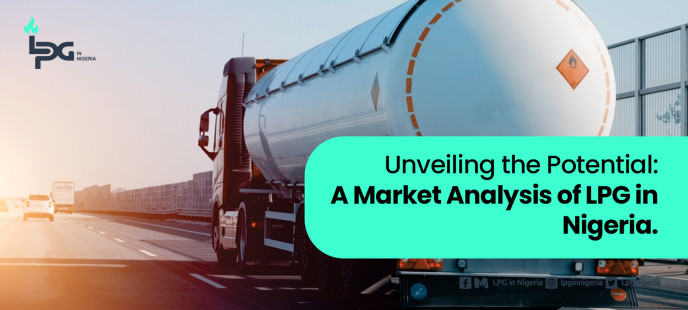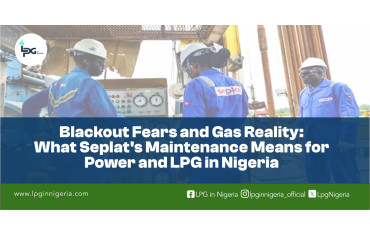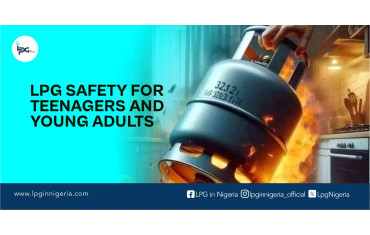- 7367
- 0
Sharing Ideas and Updates on LPG in Nigeria and related information to enable effective collaboration within the LPG Value Chain
Unveiling The Potential - A Market Analysis Of LPG In Nigeria

Liquefied Petroleum Gas (LPG) plays a pivotal role in Nigeria's energy landscape, offering a cleaner and more efficient alternative to traditional cooking fuels. This blog delves into the current state of the LPG market in Nigeria, analyzing consumption trends, import/export statistics, and future growth prospects. Furthermore, it explores the multifaceted factors shaping market growth, including government policies, consumer awareness, and infrastructure development.
Current State of the Market
Consumption Trends: Nigeria's LPG consumption has been steadily increasing in recent years, driven by population growth, urbanization, and a shift towards cleaner cooking fuels. Despite this growth, per capita consumption of LPG in Nigeria remains relatively low compared to global averages, indicating significant untapped potential.
Import/Export Statistics: Nigeria is predominantly reliant on imports to meet its LPG demand. While the country boasts significant natural gas reserves, limited domestic production capacity and infrastructure constraints necessitate substantial imports. Export statistics are negligible, highlighting the domestic focus of the market.
Market Players: The Nigerian LPG market features a mix of multinational corporations, local distributors, and independent retailers. Competition is fierce, with players vying for market share through pricing strategies, product differentiation, and service quality.
Factors Influencing Market Growth:
Government Policies: Government policies have a profound impact on the LPG market, ranging from fiscal incentives and subsidies to regulatory frameworks and infrastructure investments. Initiatives such as the National LPG Expansion Implementation Plan aim to promote LPG adoption through targeted interventions and policy support.
Consumer Awareness: Increasing consumer awareness about the health, environmental, and economic benefits of LPG is driving market growth. Educational campaigns, media outreach, and grassroots advocacy play a crucial role in dispelling myths, addressing safety concerns, and fostering positive perceptions of LPG.
Infrastructure Development: The expansion of LPG infrastructure, including storage facilities, distribution networks, and refilling stations, is essential for market growth. Investments in infrastructure projects, both by the government and private sector stakeholders, are key enablers of market expansion, particularly in underserved regions.
Future Growth Prospects:
Rising Demand: With Nigeria's burgeoning population and increasing urbanization, demand for LPG is expected to continue rising. The transition away from traditional cooking fuels towards cleaner alternatives presents significant growth opportunities for the LPG market.
Policy Support: Continued government support through policy interventions, regulatory reforms, and infrastructure investments will be critical for unlocking the full growth potential of the LPG market. Streamlined licensing processes, investment incentives, and subsidy schemes can incentivize private sector participation and stimulate market expansion.
Infrastructure Investments: Strategic investments in LPG infrastructure, particularly in underserved regions and rural areas, will be instrumental in meeting growing demand and enhancing market accessibility. Public-private partnerships can catalyze infrastructure development projects, leveraging expertise and resources from both sectors.
Note: The market stagnated between 2022 and 2023 primarily due to high costs, and we anticipate a similar trend this year. Additionally, our dependency on imports stands at approximately 50 percent, a figure that may undergo a shift soon. This is largely attributed to the Federal Government of Nigeria's decision to impose a ban on LPG exports by production facilities, notably affecting Chevron and Mobil BRT.
The LPG market in Nigeria holds immense potential for growth and development, driven by increasing consumer demand, supportive government policies, and investments in infrastructure. By harnessing these opportunities and addressing existing challenges, Nigeria can accelerate the transition towards cleaner energy sources, improve public health outcomes, and foster sustainable economic development. Collaboration between government, industry stakeholders, and civil society is essential for realizing the full potential of the LPG market and achieving a brighter, cleaner future for Nigeria.
Your feedback is invaluable to us and helps ensure that we cover all aspects comprehensively.
















0 Comment.